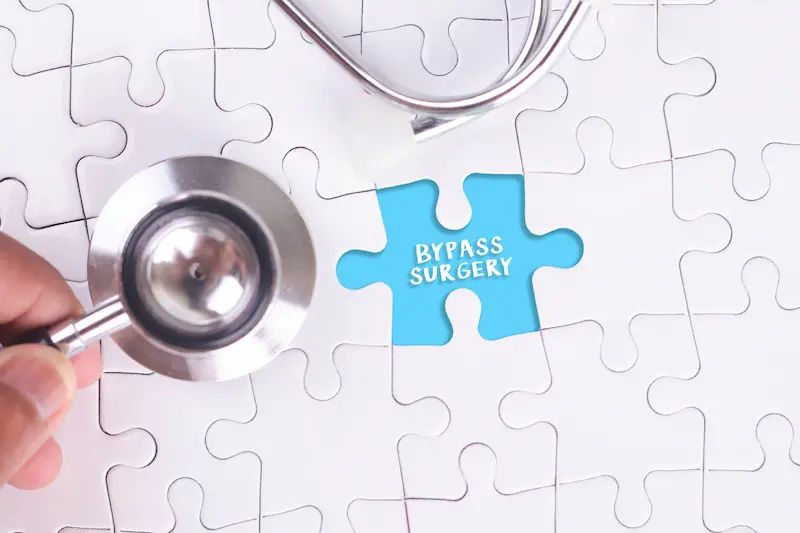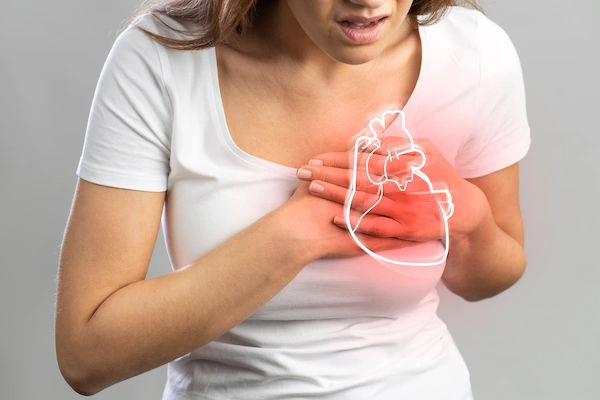Heart Attacks in Young People: Causes, Early Signs and Prevention
Learn the causes, early warning signs, and preventive measures for heart attacks in young adults to protect your heart health.

Written by Dr. Shaik Abdul Kalam
Reviewed by Dr. J T Hema Pratima MBBS, Fellowship in Diabetes Mellitus
Last updated on 13th Jan, 2026

Introduction
The image of a heart attack victim is often an older man clutching his chest. However, a silent and alarming shift is occurring: heart attacks are increasingly striking young, seemingly healthy adults. This trend shatters the myth that cardiovascular disease is a problem for later life, making it crucial for younger generations to understand their risks. A heart attack, or myocardial infarction, happens when blood flow to the heart is blocked, often by a blood clot or plaque buildup. While the underlying mechanism is similar across ages, the triggers and presentations can be drastically different for someone in their 20s, 30s, or 40s compared to someone in their 70s. This article delves into the complex factors, from lifestyle choices to rare genetic conditions, that are leading to this rise. We will explore the early, often-missed warning signs and equip you with actionable knowledge to protect your heart health today. Understanding these factors is the first critical step toward prevention and early intervention.
Consult a Cardiologist for the best advice
Alarming Statistics: Heart Attacks Are Not Just for the Elderly
While overall heart attack rates have declined in older populations due to better medical care, the opposite is true for younger adults. Data from the American Heart Association indicates that heart attacks are rising in adults under 50, and particularly in women. A study published in the journal Circulation found that although young people make up a small percentage of total heart attack patients, the rate of hospitalizations for heart attacks in adults aged 35-54 has increased. This trend is especially pronounced among young women. This demographic is less likely to be aware of their risk factors and may dismiss early symptoms, leading to delayed treatment and worse outcomes. This statistical reality underscores the urgent need for increased awareness and proactive heart health management from an early age.
Top Causes of Heart Attack in Young People
The etiology of a heart attack in a young person is often a complex interplay of traditional risk factors presenting earlier and more aggressive non-traditional triggers.
Traditional Risk Factors Showing Up Earlier
The classic risk factors for heart disease are now manifesting with greater severity in younger populations due to modern lifestyles.
- Hypertension (High Blood Pressure: Often called the "silent killer," uncontrolled high blood pressure damages arteries over time, making them more susceptible to plaque buildup and rupture. The stress of modern life, poor diet, and lack of exercise are major contributors.
- Dyslipidemia (High Cholesterol): High levels of LDL ("bad") cholesterol and triglycerides can lead to accelerated atherosclerosis (hardening of the arteries) even in young adults. Diets high in processed foods and trans fats are a primary driver.
- Diabetes and Pre-Diabetes: The insulin resistance associated with type 2 diabetes severely damages blood vessels and dramatically increases heart attack risk. The global epidemic of obesity has led to a surge in diabetes among young adults and even adolescents.
- Smoking and Vaping: Tobacco use is one of the most significant risk factors. It damages the lining of arteries, reduces oxygen in the blood, and promotes clotting. Vaping, often perceived as a safer alternative, is not risk-free; nicotine causes vasoconstriction and spikes in blood pressure, posing a significant threat to cardiovascular health.
Non-Traditional and Unique Risk Factors
This is where the causes diverge significantly from older patients.
- Substance Abuse: Cocaine and Amphetamines: Illicit stimulants are a leading cause of heart attack in the young. Cocaine can cause sudden, intense coronary artery spasms, increased heart rate, and elevated blood pressure, triggering a heart attack even in individuals with otherwise clean arteries.
- Spontaneous Coronary Artery Dissection (SCAD): This is a rare but critical condition where a tear forms in one of the heart's arteries. It is a major cause of heart attacks in healthy women under 50, particularly new mothers. The exact cause of SCAD is not fully understood but is thought to be related to hormonal factors and underlying blood vessel abnormalities.
- Genetic and Hereditary Conditions: Conditions like familial hypercholesterolemia (extremely high cholesterol from birth) or hypercoagulable states (where the blood clots too easily) can predispose young individuals to heart attacks. A strong family history of early heart disease is a major red flag.
Recognising the Early Signs: It Doesn't Always Feel Like "The Movie"
Young people often experience "atypical" symptoms, which are frequently dismissed as indigestion, anxiety, or a pulled muscle. This leads to dangerous delays in seeking help.
Common Symptoms to Never Ignore
Chest pain, pressure, squeezing, or fullness (lasting more than a few minutes or going away and coming back).
- Pain or discomfort in one or both arms, the back, neck, jaw, or stomach.
- Shortness of breath, with or without chest discomfort.
- Breaking out in a cold sweat, nausea, or lightheadedness.
- Atypical Symptoms More Common in Young Adults
- Younger patients, especially women, may report:
- Overwhelming and unusual fatigue for days or weeks prior.
- Heartburn, nausea, vomiting, or abdominal pain.
- Dizziness or fainting.
- Unexplained anxiety or a sense of "impending doom."
Symptoms in Women vs. Men
While chest pain is the most common symptom for both, women are more likely than men to experience the cluster of atypical symptoms like shortness of breath, nausea/vomiting, and back or jaw pain. This often leads to misdiagnosis.
If you experience any of these symptoms, especially if they are sudden and severe, do not wait. Consult a doctor online with Apollo24|7 for an immediate evaluation or seek emergency care.
Why Early Diagnosis is Critical for Young Survivors
Surviving a heart attack at a young age comes with a long road ahead. Early diagnosis and swift treatment are paramount to preserving heart muscle function. Younger survivors face a lifetime of increased risk for another cardiac event, heart failure, or other complications. This makes aggressive secondary prevention, managing risk factors, cardiac rehabilitation, and lifelong medication absolutely essential. The psychological impact is also significant, often involving anxiety, depression, and PTSD, which must be addressed as part of holistic care.
Prevention Strategies: Protecting Your Heart in Your 20s, 30s, and 40s
The good news is that up to 80% of heart attacks are preventable through lifestyle changes and proactive management.
Lifestyle Modifications: Diet and Exercise
Adopt a heart-healthy diet rich in fruits, vegetables, whole grains, lean protein, and healthy fats (like those in nuts and olive oil). Limit processed foods, sugar, and red meat. Aim for at least 150 minutes of moderate-intensity aerobic exercise (like brisk walking) per week.
The Importance of Regular Health Screenings
You can't manage what you don't measure. Regular health screenings are non-negotiable. Know your numbers: blood pressure, cholesterol (lipid profile), and blood sugar. Apollo24|7 offers a convenient home collection for tests like lipid profile and HbA1c, making it easy to stay on top of your health from the comfort of your home.
Managing Stress and Mental Health
Chronic stress leads to elevated cortisol levels, increased blood pressure, and inflammation. Incorporate stress-reduction techniques like mindfulness, meditation, yoga, or simply ensuring you have adequate work-life balance and healthy social connections.
Get Your Health Assessed
Conclusion: Taking Charge of Your Heart Health
The narrative that heart disease is an older person's ailment is dangerously outdated. The evidence is clear: young adults are increasingly vulnerable. This reality demands a paradigm shift in how we approach our health. Empowerment through knowledge is our greatest weapon. By understanding the unique risks and often-subtle warning signs, you can become an advocate for your own well-being. Prioritise preventive care, listen to your body, and never hesitate to seek a medical opinion for concerning symptoms. Your heart health is the foundation of your future. Taking proactive, consistent steps, today whether it's choosing a salad over fast food, going for a walk, getting a health screening, or consulting a doctor on Apollo24|7 about a family history of heart disease, can literally save your life. Start protecting your tomorrow, today.
Consult a Cardiologist for the best advice

Dr. Anand Ravi
General Physician
2 Years • MBBS
Bengaluru
PRESTIGE SHANTHINIKETAN - SOCIETY CLINIC, Bengaluru

Dr. Sumanjita Bora
Cardiologist
9 Years • MBBS, PGDCC
Bengaluru
Apollo Clinic, Sarjapur Road, Bengaluru

Dr. Praveen Subbanna
Cardiologist
10 Years • MBBS, M.D. (JIPMER. PONDICHERRY), DM (cardiology, SMS MEDICAL COLLEGE, JAIPUR)
Bengaluru
Apollo Hospitals Bannerghatta Road, Bengaluru

Dr. Prashant Adeppa
Cardiologist
10 Years • MBBS, MD General Medicine, DM Cardiology (Armed Forces Medical College)
Bengaluru
Apollo Hospitals Bannerghatta Road, Bengaluru

Dr. Zulkarnain
General Physician
2 Years • MBBS, PGDM, FFM
Bengaluru
PRESTIGE SHANTHINIKETAN - SOCIETY CLINIC, Bengaluru
More articles from Heart Attack
Frequently Asked Questions
Can a perfectly fit young person have a heart attack?
Yes. While fitness reduces risk, it doesn't eliminate it. Underlying genetic conditions (like familial hypercholesterolemia), congenital heart defects, or triggers like SCAD or substance abuse can cause heart attacks in individuals with no traditional risk factors.
What is the most common symptom of a heart attack in a young woman?
While chest pain or pressure is common, young women are significantly more likely than men to experience a combination of other symptoms like unexplained shortness of breath, nausea/vomiting, and extreme fatigue, often in the weeks leading up to the event.
How can I get my cholesterol checked if I'm young and feel healthy?
Preventive health screenings are key. You can talk to your doctor about getting a lipid panel. For convenience, services like Apollo24|7's home collection allows you to book a test online and get your blood drawn at home, making the process seamless.
Is vaping really that bad for my heart?
Yes. Vaping aerosols contain nicotine, which spikes adrenaline, increases heart rate and blood pressure, and promotes artery stiffness and inflammation. The long-term cardiovascular effects are still being studied, but current evidence points to significant harm.
What should I do if I think I'm having a heart attack?
Do not wait. Call for emergency medical services immediately. Chew one regular-strength aspirin (unless you are allergic) as it can help inhibit blood clotting. Sit down, stay calm, and wait for help to arrive.
.webp)



